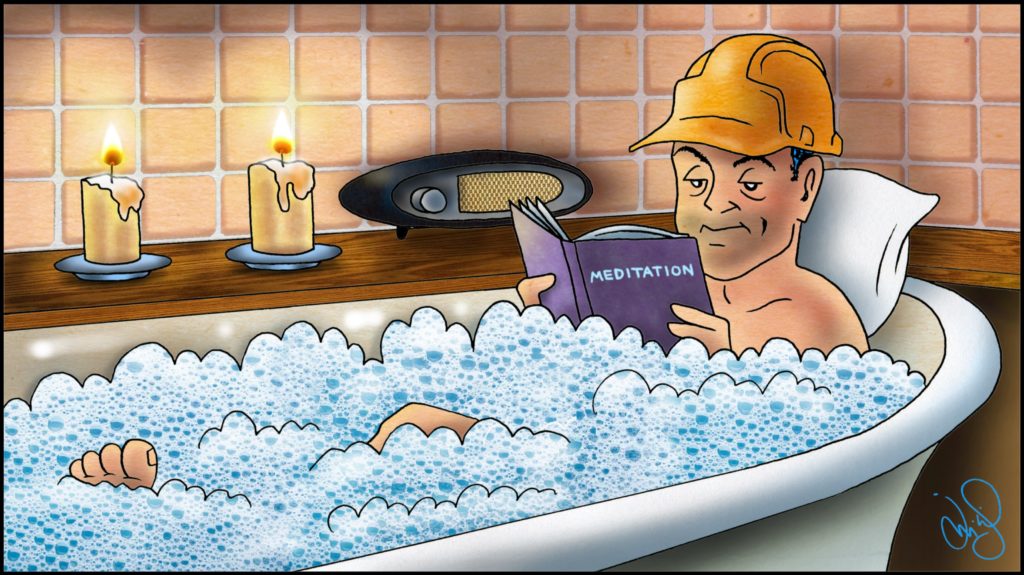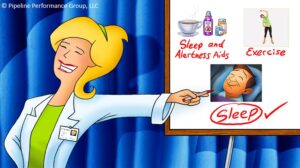Take Time to Relax
Do you like this month’s picture of the pipeliner taking a bubble bath? Is that one of your relaxation methods? An important fatigue countermeasure is taking time for relaxation, recreation, restoration, and renewal. Shift work and working in any job for a pipeline company is both fatiguing and stressful. Long hours of demanding work can have negative effects on our health, and there are numerous studies that demonstrate the health benefits of relaxation techniques.
Scarlet Knight, one of our consultants, recommends that each of us choose methods that meet our needs and that we find helpful individually. These are some practices we suggest in our fatigue training sessions:
- Stretching
- Massage
- Napping
- Deep breathing
- Progressive muscle relaxation
- Leisurely walking
- Time outdoors
- Meditation
- Prayer
- Listening to music
- Singing, whistling, yodeling
You could also consider the practices of yoga, tai chi, and qigong. When I was in China in 2010, it was common to see large groups of people in parks every morning doing tai chi. Perhaps people in a control room could do some rhythmic movement together during a shift. I once saw three controllers on night shift stand up, turn on some music, and dance for a few minutes. Would you do that? There is an immediate effect on alertness, mood, and blood flow.
I find it difficult to relax, even though I know it is important. Someone told me once that I think too much, and should think less to relax more. Some things I am finding helpful are stretching, getting a massage about once a month, napping, using the swimming pool or Jacuzzi in the hotels where we stay an hour or so before bedtime, sitting outside without any electronic devices, listening to music, and singing. I am not patient enough for meditation and progressive muscle relaxation. It might be a good idea to try a bubble bath occasionally!
“What’s The Best Way to Take a Nap?” (Wall Street Journal 9-19-17 Heidi Mitchell): This article quotes Dr. David Dinges on ways to optimize napping. He says, “Being awake is like carrying a bag of bricks on your back. The longer you are awake, the more bricks you add. When you take a nap, you remove some of those bricks.”
Humans are programmed to sleep at night, and to take a nap in the midafternoon. To make the most of this biological need and to use it for relaxation and restoration:
- Don’t overthink it
- Find a cool, dark, quiet place to lie down or put your head down
- Put your electronics away
- Set an alarm so you nap between 15 and 60 minutes
- To alleviate post-nap sleep inertia, have a cup of coffee
“What Happens When You Quit Drinking?” (Atlanta Journal-Constitution 9-12-17 Rose Kennedy): The staff of New Scientist gave up liquor for one month and their ratings of sleep quality went up almost 10%. Other benefits were reduced liver fat, lower cholesterol, and weight loss. The negative result was that participants reported less social contact. Kevin Donahue, an editor of Men’s Health, also abstained from alcohol for 30 days. He reported, “Alcohol messed with my sleep. It tends to wake me in the early morning and I don’t sleep deeply again till just before dawn. It doesn’t seem like much of a disruption, but I could feel it the morning.”
Based on those articles, napping might be a positive relaxation method, and drinking alcohol might not be a great way to relax. Happy Thanksgiving!
MANAGING FATIGUE EDUCATIONAL PROGRAM | Charles Alday © 2017 Please Distribute to Others.




